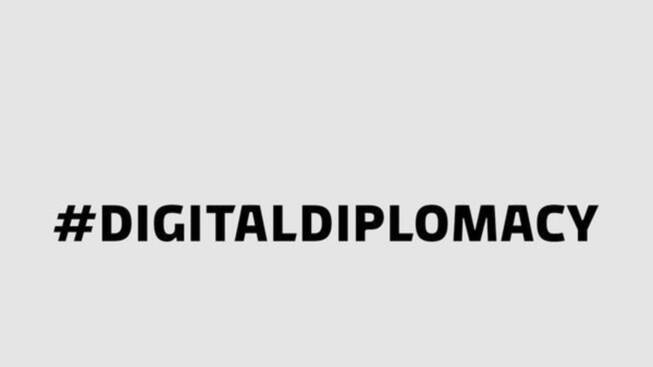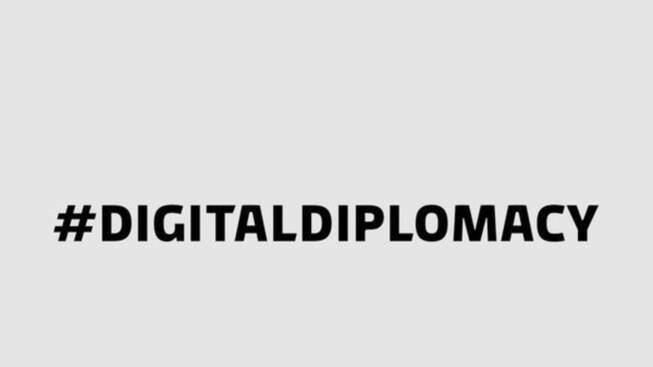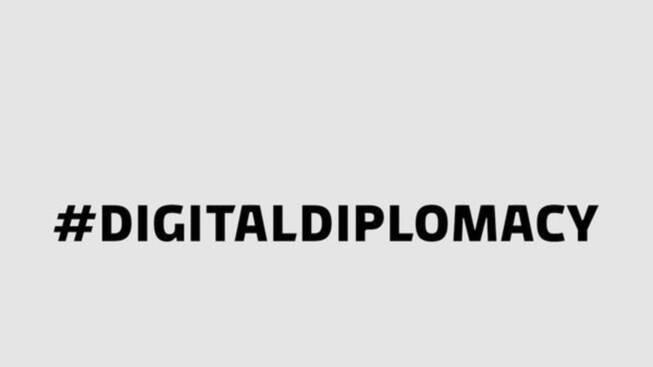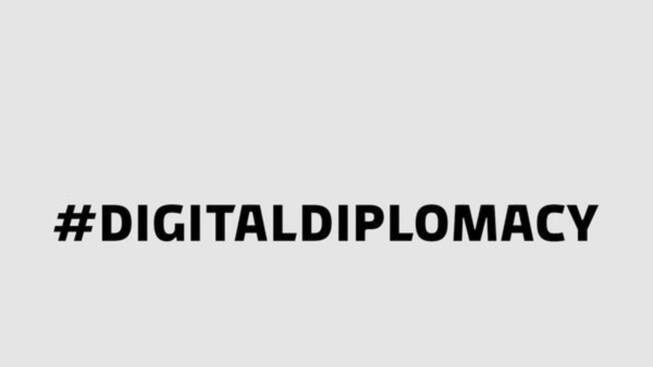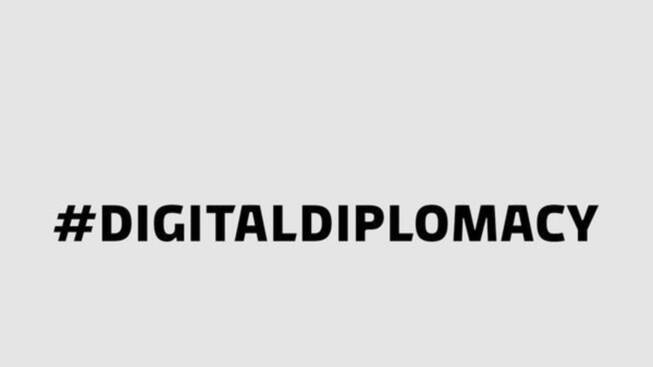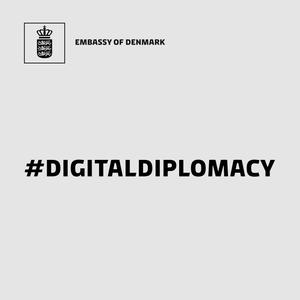
#DigitalDiplomacy
Udenrigsministeriet
Welcome to The #DigitalDiplomacy Podcast, produced by the Embassy of Denmark in Madrid. Here we take a closer look at diplomacy in the digital age and how it is affected by the role that technology and digitalization is playing in the rapid...
- 36 minutes 28 secondsNancy Groves: #Digitaldiplomacy at the United Nations
In this episode of The #DigitalDiplomacy Podcast, we talk to Nancy Groves who at the time of recording was Head of the Social Media Section at the UN Department for Global Communications in New York.
Groves tells us about how a multilateral organization like the United Nations works with social media, how she and her team choose the topics the publish, the limitations and challenges they face in their daily work of communicating the UN and its priorities all around the globe, and how they plan and execute their big week each year in September when the UN General Assembly is in session.
Since this episode was recorded – it took a little while to edit it this time… – Nancy has changed both jobs and continents and is now the Digital Strategy Chief for the UN Environment Programme in Nairobi, Kenya.
She is an avid tweep and you can follow her at @Nancy_Groves. You can also follow her here: medium.com/@nancy_groves .
Thank you for listening to this episode! If you liked it, please share it with others who are interested in the world of diplomacy and international relations in the 21st Century.
We’ll be back as soon as possible with more interviews with interesting perspectives on the way diplomacy is changing, evolving, and adapting to the disruptive changes our societies are undergoing these years.
The #DigitalDiplomacy Podcast is produced by the Embassy of Denmark in Spain. It is edited and hosted by Communications Officer Mikkel Larsen.
Music by Bebeto, “Ambient Loop” ((CC) / freesound.org/people/bebeto/sounds/554/ ).21 June 2019, 3:52 pm - 50 minutes 6 secondsIlan Manor: The digitalization of #publicdiplomacy
In this episode of The #DigitalDiplomacy Podcast, we talk to Ilan Manor who is one of the most prolific digital diplomacy scholars at the moment, a DPhil candidate at the University of Oxford and a member of the Oxford Digital Diplomacy Research Group.
We talk to Manor about his book "The Digitalization of Public Diplomacy" that just came out this January: https://www.palgrave.com/us/book/9783030044046
Manor tells us why he prefers the term digitalization of diplomacy to other terms like digital diplomacy or diplomacy 2.0, why we cannot analyse the digitalization of diplomacy without seeing diplomats and MFAs as parts of the digital society that surrounds them, about the meaning of concepts like engagement, listening and distance in the digital age and much more.
The chapter referred to in the episode on The aesthetics of violent extremist and counter-violent extremist communication was co-written with Rhys Crilley and published in the recent book Countering Online Propaganda and Extremism: The Dark Side of Digital Diplomacy, eds. Corneliu Bjola and Jammes Pamment (2019).
Among Manor’s other publications can be mentioned the monograph Are we there yet? Have MFAs realized the potential of digital diplomacy (2016), published as a part of Brill’s Research Perspectives in Diplomacy and Foreign Policy. And his analysis of America’s Selfie Diplomacy in Digital Diplomacy: Theory and Practice (2015).
Apart from these publications, he has contributed to a long series of academic journals, among them the Cambridge Review of International Affairs, Global Affairs, Global Policy and International Affairs.
And he is an avid tweep and blogger and can be followed here: @ilanmanor and https://digdipblog.com/
Thank you for listening to this episode! If you liked it, please share it with others who are interested in the world of diplomacy and international relations in the 21st Century.
We’ll be back as soon as possible with more interviews with interesting perspectives on the way diplomacy is changing, evolving, and adapting to the disruptive changes our societies are undergoing these years.
The #DigitalDiplomacy Podcast is produced by the Embassy of Denmark in Spain. It is edited and hosted by Communications Officer Mikkel Larsen.
Music by Bebeto, “Ambient Loop” ((CC) / freesound.org/people/bebeto/sounds/554/ ).9 February 2019, 12:35 am - 20 minutes 53 secondsMatthias Erlandsen: Digital public diplomacy in Latin America
In this episode of The #DigitalDiplomacy Podcast we talk to Matthias Erlandsen, journalist and PhD student of Communication Sciences at the Pontifical Catholic University of Chile and one of the editors of a recent book on digital public diplomacy in Latin America.
In the interview, Matt talks about the findings in the book and gives us a lot of examples of different diplomatic uses of digital tools in the countries in the region.
You can follow Matt on Twitter as @matterlandsen . You can download the book on digital public diplomacy in Latin America (in Spanish), that he co-edited with Daniel Aguirre and Miguel Ángel López, for free here: http://libros.uchile.cl/720 . Also, you can find an article on the topic of digital public diplomacy in Latin America (In Spanish and English) that Matt recently co-wrote with Daniel Aguirre Azócar for the Mexican Journal of Foreign Relations (RMPE, May-August 2018), here: https://revistadigital.sre.gob.mx/ - filled with many other interesting articles.
Thank you for listening to this episode! If you liked it, please share it with others that you think could be interested. And please give us a review on iTunes or Soundcloud, so that we can start getting traction and reach many more people around the world who are interested in the world of diplomacy and international relations in the 21st Century.
We’ll be back soon with more interviews with interesting perspectives on the way diplomacy is changing, evolving, and adapting to the disruptive changes our societies and international relations are undergoing these years.
The #DigitalDiplomacy Podcast is produced by the Embassy of Denmark in Spain. It is edited and hosted by Communications Officer Mikkel Larsen.
Music by Bebeto, “Ambient Loop” ((CC) / https://freesound.org/people/bebeto/sounds/554/ ).5 September 2018, 6:56 pm - 39 minutes 53 secondsMatthias Lüfkens: The #Twiplomacy studies
In this episode of The #DigitalDiplomacy Podcast we talk to Matthias Lüfkens, who is Head of Digital at the PR agency Burson Cohn & Wolfe in Geneva, Switzerland, and author of the annual #Twiplomacy study.
In the interview, Matthias Lüfkens talks about the results of the Twiplomacy study 2018 and the changes he has witnessed in the diplomatic uses of social media since he started the study series in 2012. Lüfkens tells us how world leaders and foreign ministries use the different social media platforms, what they communicate, and who they direct their messages to. He talks about the need for diplomatic actors to be on social media, disinformation, filter bubbles, risks and mistakes, why the Danish Prime minister Lars Løkke Rasmussen and Foreign Minister Anders Samuelsen are among his favorite digital diplomats and much more.
You can follow Matthias Lüfkens on Twitter as @luefkens. You can find more information about the different Twiplomacy studies at @Twiplomacy and read them here: https://twiplomacy.com .
Thank you for listening to this episode! If you liked it, please share it with others that you think could be interested. And please give us a review on iTunes or Soundcloud, so that we can start getting traction and reach many more people around the world who are interested in the world of diplomacy and international relations in the 21st Century.
We’ll be back soon with more interviews with interesting perspectives on the way diplomacy is changing, evolving, and adapting to the disruptive changes our societies are undergoing these years.
The #DigitalDiplomacy Podcast is produced by the Embassy of Denmark in Spain. It is edited and hosted by Communications Officer Mikkel Larsen.
Music by Bebeto, “Ambient Loop” ((CC) / https://freesound.org/people/bebeto/sounds/554/ ).25 July 2018, 2:33 pm - 45 minutes 15 secondsBen Giddings: Digital communications at the FCO
In this episode of The #DigitalDiplomacy Podcast, we dive into the practice of digital communications at the British foreign service with Ben Giddings, Head of Global Digital Network at the Foreign and Commonwealth Office.
As he introduces himself, Ben is Head of the Overseas Digital Network at the FCO, where he has worked in digital communications for the last 10 years. Prior to that, he worked in the private sector running websites, managing products, and tracking digital ad spend on things called ‘banner ads’. He's been around the internet long enough to remember a time when AOL was on the verge of world domination, social media was called forums, and no-one had ever heard of Facebook. He can be followed on Twitter at @bjgiddings .
In the interview, Ben tells us about his daily work, implementing the digital strategy of the FCO and finding the balance between the strategic global messages and different local contexts. We also talk about the challenges of data overload and disinformation , as well as, the need for a new of mind-set in foreign ministries to focus more on measurement and evaluation to become better at finding out what works and what not on digital platforms in a more cost-effective way.
The interview was recorded “on neutral ground” in a hotel bar in Madrid, which explains the background noise and the music that suddenly started...
Also, the interview was recorded before the eruption of the Salisbury-case, which is why it is not mentioned in the episode.
Thank you for listening to this episode! If you like it, please share it with others that you think could be interested. And please give us a (nice) review on iTunes or Soundcloud, so that we can continue reaching more people around the world who are interested in the world of diplomacy and international relations in the 21st Century.
We’ll be back soon with more interviews with interesting perspectives on the way diplomacy is changing, evolving, and adapting to the disruptive changes our societies and the relationship between them are undergoing these years.
The #DigitalDiplomacy Podcast is produced by the Embassy of Denmark in Spain. It is edited and hosted by Communications and Policy Officer Mikkel Larsen.
Music by Bebeto, “Ambient Loop” ((CC) / https://freesound.org/people/bebeto/sounds/554/ ).17 April 2018, 9:48 am - 36 minutes 51 secondsShaun Riordan: Strategic #digitaldiplomacy
In this episode of The #DigitalDiplomacy Podcast, we have talked with Shaun Riordan, Senior Visiting Fellow of the Netherlands Institute for International Relations “Clingendael”, a member of the Social Media Team of the Hague Journal of Diplomacy, and a member of the Public Diplomacy Advisory Board of the Sustainable Development Goals Fund.
He served 16 years as a British Diplomat, including postings to New York, Beijing and Madrid, and spells in the Counter-Terrorism and Eastern Adriatic Units of the Foreign Office.
Since leaving the Diplomatic Service, he has worked as an independent consultant to both governments and companies on the analysis and management of geopolitical risk and innovation in diplomacy, as well as a lecturer at several international universities and diplomatic academies. Currently, he specialises in Business Diplomacy and Cyberdiplomacy (the application of diplomatic techniques and mindsets to cyberspace).
He is author of, a.o., The New Diplomacy (2003), and Cyberdiplomacy: Doing Diplomacy in Cyberspace (2018 – forthcoming), and co-author of Diplomatic Futures: Integrative Diplomacy in the 21st Century (2010). He has contributed to numerous academic journals.
He writes a regular blog on diplomacy and geopolitics, which can be found at www.shaunriordan.com, and he can be followed on Twitter at @shaun_riordan .
In the interview, Shaun talks to us about the need for a more strategic approach to digital diplomacy, why algorithms and echochambers are serious threats to public diplomacy, the role of MFA's as network managers and much more.
Thank you for listening to this episode! If you like it, please share it with others that you think could be interested. And please give us a (nice) review on iTunes or Soundcloud, so that we can continue reaching more people around the world who are interested in the world of diplomacy and international relations in the 21st Century.
We’ll be back soon with more interviews with interesting perspectives on the way diplomacy is changing, evolving, and adapting to the disruptive changes our societies and the relationship between them are undergoing these years.
The #DigitalDiplomacy Podcast is produced by the Embassy of Denmark in Spain. It is edited and hosted by Communications and Policy Officer Mikkel Larsen.
Music by Bebeto, “Ambient Loop” ((CC) / https://freesound.org/people/bebeto/sounds/554/ ).4 March 2018, 5:30 pm - 24 minutes 31 secondsAndreas Sandre: Diplomacy 3.0
In this, the third episode of The #DigitalDiplomacy Podcast, we have talked to Andreas Sandre, Press and Public Affairs Officer at the Embassy of Italy in Washington DC., and the author of “Digital Diplomacy: Conversations on Innovation in Foreign Policy” (2015) and “Twitter for Diplomats” (2013). Andreas has contributed articles to the Huffington Post, the Global Policy Journal, and other publications, and has spoken at numerous international events, including TEDxStockholm and Mashable Digital Beltway, with a focus on digital diplomacy, digital communications strategies, and technology policy.
In the interview, Andreas Sandre talks about how diplomacy is evolving to become "3.0" and how diplomats can use social media to understand and use technology to shape better foreign policies and better understand the world around us. He talks about implementing a culture of innovation in the diplomatic community, about how he himself uses social media in his work, and how selfies and emojis can help “make foreign policy a little bit less foreign and a little bit more sexy”.
You can follow Andreas Sandre on Twitter and Medium as @andreas212nyc. You can find his book "Digital Diplomacy: Conversations on Innovation in Foreign Policy" here: http://ow.ly/ujOV30hSpgl . And you can download “Twitter for Diplomats” as an e-book here: http://ow.ly/eywi30hSpiu .
Thank you for listening to this episode! If you liked it, please share it with others that you think could be interested. And please give us a (nice) review on iTunes or Soundcloud, so that we can start getting traction and reach many more people around the world who are interested in the world of diplomacy and international relations in the 21st Century.
We’ll be back soon with more interviews with interesting perspectives on the way diplomacy is changing, evolving, and adapting to the disruptive changes our societies and the relationship between them are undergoing these years.
The #DigitalDiplomacy Podcast is produced by the Embassy of Denmark in Spain. It is edited and hosted by Communications and Policy Officer Mikkel Larsen.
Music by Bebeto, “Ambient Loop” ((CC) / https://freesound.org/people/bebeto/sounds/554/ ).19 January 2018, 3:30 pm - 37 minutes 48 secondsCorneliu Bjola: What is #digitaldiplomacy?
In this, the second episode of The #DigitalDiplomacy Podcast, we have talked to Corneliu Bjola, Associate Professor in Diplomatic Studies at the University of Oxford, Chair of the Oxford Digital Diplomacy Research Group, and author and co-editor of a series of books on diplomacy, a.o. “Digital Diplomacy: Theory and Practice” (2015).
In the interview, Corneliu Bjola talks about how diplomacy is changing in the digital age, the importance of organizational culture and the difficult perception of loss of control, the role of creativity, transparency and trolls, the new ethics of diplomacy, the initiative of the new Danish Tech Ambassador, and much more.
After listening to the interview, you can learn more about Corneliu Bjola and his work here: www.cbjola.com . You can follow him on Twitter at @cbjola . And you can find the book "Digital Diplomacy: Theory and Practice", that Bjola has co-edited with Marcus Holmes, here: http://ow.ly/YgBQ30hncBY
Thank you for listening to this episode! If you liked it, please share it with others that you think could be interested.
And please give us a (nice) review on iTunes or Soundcloud, so that we can start getting traction and reach many more people around the world who are interested in the world of diplomacy and international relations in the 21st Century.We’ll be back in the new year with more interviews with interesting perspectives on the way diplomacy is changing, evolving, and adapting to the disruptive changes our societies and the relationship between them are undergoing these years.
The #DigitalDiplomacy Podcast is produced by the Embassy of Denmark in Spain.
Music by Bebeto, “Ambient Loop” ((CC) / https://freesound.org/people/bebeto/sounds/554/).21 December 2017, 3:28 pm - 38 minutes 50 secondsThe #DigitalDiplomacy Podcast: Casper Klynge on #Techplomacy (1)
In this, the first episode of The #DigitalDiplomacy Podcast, we have talked to Casper Klynge, Denmark’s new Tech Ambassador based in Silicon Valley.
Casper Klynge tells us about his first months in the new job as probably the World’s first Tech Ambassador (but not the last one – recently, after the recording of the interview, France has also named an Ambassador for Digital Affairs).
Casper Klynge explains why Denmark has chosen to name a Tech Ambassador, and talks about how he sees diplomacy evolving in the coming years, what it can learn from the tech sector, what it in return can learn from diplomacy, and much more.
After listening to the interview, you can learn more about Casper Klynge and his work here: http://techamb.um.dk/ . And you can follow him on Twitter at @DKTechAmb or Facebook at https://www.facebook.com/DKTechAmb/ .
Thank you for listening to this episode! If you liked it, please share it with others that you think could be interested.
And please give us a (nice) review on iTunes or Soundcloud, so that we can start getting traction and reach many more people around the world who are interested in the world of diplomacy and international relations in the 21st Century.
We’ll be back soon with a new interview with interesting perspectives on the way diplomacy is changing, evolving, and adapting to the disruptive changes our societies and the relationship between them are undergoing these years.
The #DigitalDiplomacy Podcast is produced by the Embassy of Denmark in Spain.
Music by Bebeto, “Ambient Loop” ((CC) / https://freesound.org/people/bebeto/sounds/554/).1 December 2017, 5:14 pm - More Episodes? Get the App
- https://webtv.um.dk
- da-dk
Your feedback is valuable to us. Should you encounter any bugs, glitches, lack of functionality or other problems, please email us on [email protected] or join Moon.FM Telegram Group where you can talk directly to the dev team who are happy to answer any queries.
